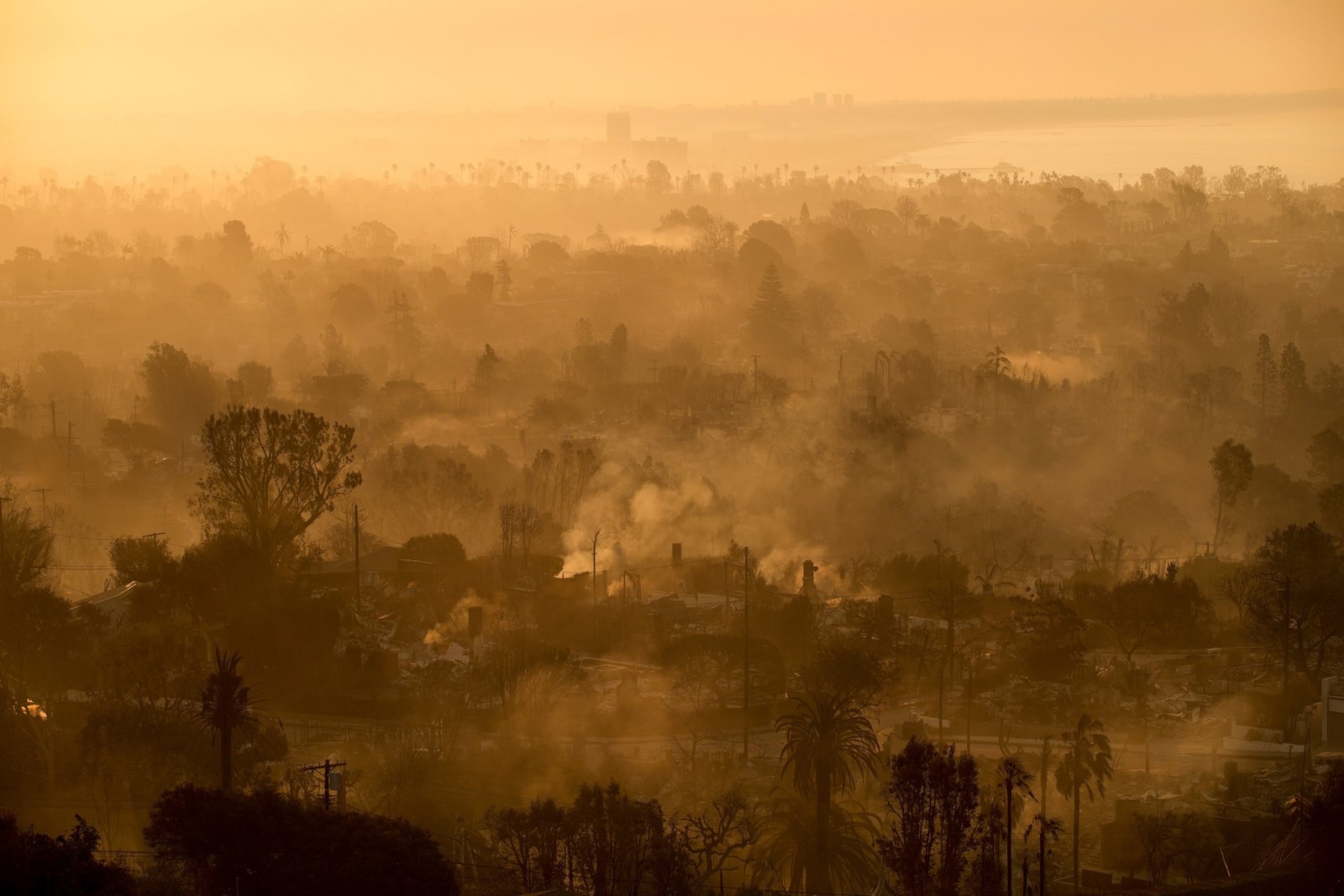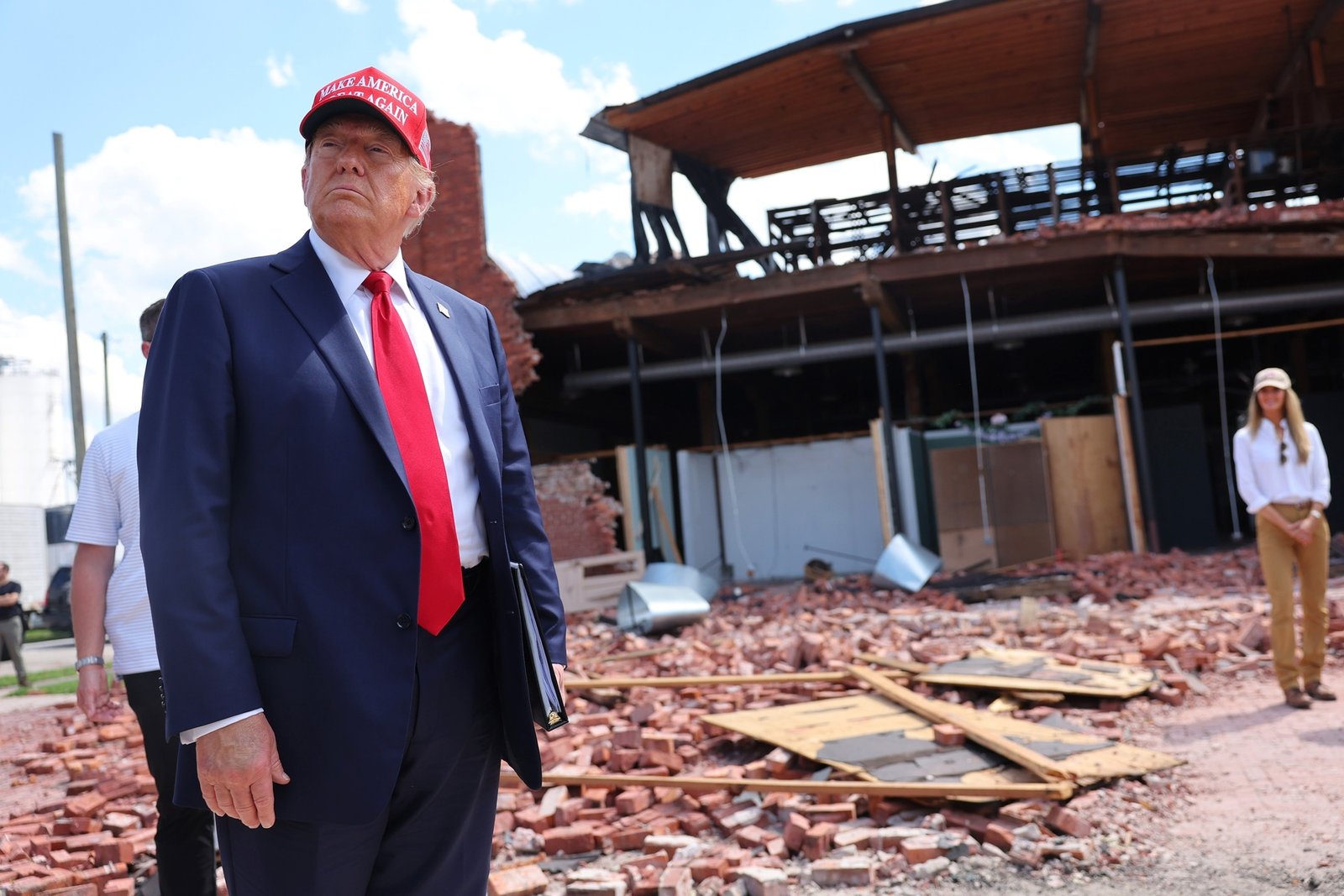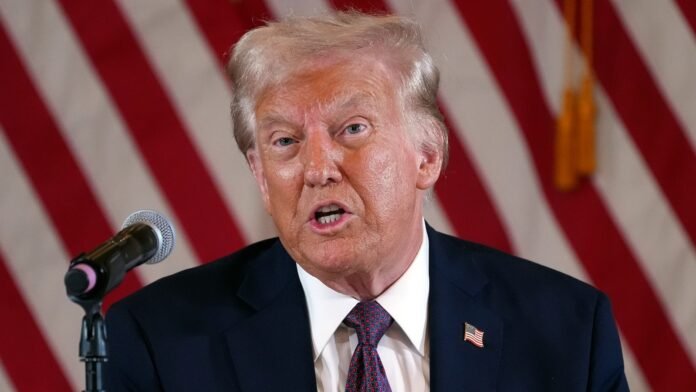As deadly wildfires burn through Southern California, President-elect Donald Trump has spent the week attacking Democratic officials and continuing a pattern of spreading misinformation about natural disasters.
“I think Gavin is pretty much incompetent, and I think the mayor is pretty much incompetent, and probably they’re both just stone-cold incompetent,” Trump said Thursday night while hosting Republican governors in Mar -a-Lago in Florida.
Since the fires broke out, Trump has pointed fingers at Gov. Gavin Newsom and President Joe Biden and spread false claims about California’s water policy and federal aid.
For example, Trump blamed Biden when he falsely claimed that the Federal Emergency Management Agency had “no money” to help California despite Congress recently passing a disaster relief grant totaling $29 billion.
The president-elect also made exaggerated claims when he accused Newsom of refusing to sign a “water restoration declaration,” saying he was instead diverting water resources to protect the endangered Sacramento-San Joaquin River Delta’s smelt.
“He wanted to protect an essentially worthless fish called a smelt by giving it less water (didn’t work!) but didn’t care about the people of California,” Trump wrote on Truth Social.
While there are regulations limiting the amount of water pumped from the Sacramento-San Joaquin River Delta to protect the species, the governor’s office said there was no such statement, calling the accusation “pure fiction.”
Biden and other emergency officials have also rejected Trump’s claims, maintaining that the fire was caused by high winds and extremely dry conditions, and that the initial water shortage occurred because power was shut off to avoid sparking additional fires.
Still, Trump has long pushed those claims, suggesting while on the campaign trail that he would withhold aid from California if Newsom did not reinstate Trump’s policies.
“The water coming here is dead. And Gavin Newsom is going to sign those papers and if he doesn’t sign those papers we’re not going to give him money to put out all his fires and we’re not going to give him money to put out his fires He has problems, Trump said at a press conference at his golf course in Los Angeles in September.
After a closed-door meeting with Senate Republicans at the Capitol on Wednesday, Trump continued to criticize Newsom’s handling of the pandemic, while ultimately arguing that the two should work together.
“So what has happened is a tragedy and the governor has not done a good job,” Trump told ABC News Senior Congressional Correspondent Rachel Scott.
“Having said that, I got along well with him — when he was governor, we worked very well together and we wanted to work together,” Trump said. “I guess it looks like we’ll be the ones to rebuild it.”
President-elect Donald Trump speaks during a meeting with Republican governors at Mar-a-Lago on Jan. 9, 2025, in Palm Beach, Fla.
Evan Vucci/AP

The devastation of the Palisades Fire is seen early in the morning in the Pacific Palisades neighborhood of Los Angeles on January 10, 2025.
John Locher/AP
This is not the first time Trump has gone after emergency officials in the wake of disasters. When hurricanes wreaked havoc in parts of Georgia and North Carolina last year, Trump quickly changed his campaign plan to focus on those areas.
During those visits, Trump repeatedly spread misinformation about FEMA’s response and falsely blamed federal officials in the Biden administration.
“They got hit by a very bad hurricane, especially North Carolina and parts of Georgia. But North Carolina really got hit. I’ll tell you what, those people should never vote for a Democrat because they withheld aid,” Trump claimed in an interview in October.
Local and federal officials warned Trump about how his politically motivated rhetoric could cause damage as affected areas tried to rebuild; however, the president-elect often refused to back down.
While visiting Asheville, North Carolina, Trump refused to condemn the violence against FEMA workers after being asked about threats against the workers.
“I think you have to let people know how they feel,” he said. “If they did a good job, I think we should say that too, because I think they should be rewarded. But if they don’t – that means if they do a bad job, then you shouldn’t say the?”
Attacking his opponent, Vice President Kamala Harris, Trump further politicized events and planned a hurricane visit with Georgia’s Republican governor Brian Kemp, whom he had until then fiercely criticized for his refusal to give in to Trump’s demands around the 2020 election.
In the battleground state of Georgia, Trump changed his tune: “Their governor is doing a great job, I’ll tell you that, and we’re all with them and with everybody.”

Donald Trump listens to a question while visiting the Chez What Furniture Store, which was damaged during Hurricane Helene on September 30, 2024 in Valdosta, Georgia.
Michael M. Santiago/Getty Images
Now, during his transition, Trump has used his social media platform to share his unfiltered thoughts, often responding to disasters in short, snappy statements, sometimes with misleading context, before all the information has been revealed.
For example, in the hours after a driver plowed into a crowd on New Orleans’ Bourbon Street, Trump responded online by saying, “The criminals coming in are far worse than the criminals we have in our country, ” and falsely implied that the suspect was an immigrant who had crossed into the United States illegally.
The suspect, Shamsud-Din Jabbar, was actually a US Army veteran who was born in the US and lived in Houston.
Even while in office, Trump faced pushback at times for peddling misinformation.
For example, when he claimed Alabama was in the path of Hurricane Dorian in 2019, leading the National Weather Service to issue a public service announcement refuting Trump’s claims. Then, that same year, when senators first failed to provide disaster aid to hurricane victims in Puerto Rico, Trump blamed local leaders as he spread false claims about the amount of aid they had already received.
“The people of Puerto Rico are GREAT, but the politicians are incompetent or corrupt,” Trump wrote at the time.
Despite this pattern, Republican governors still came to Trump’s defense Thursday night, touting his leadership skills as a president during disasters.
“You can criticize the president-elect, but I think you have to hold these other people accountable as well,” Florida Gov. Ron DeSantis told reporters at Mar-a-Lago.
“I worked well with Biden during his time on natural disasters, but I work well with Donald Trump, so I’m very confident that a state that knows we’re facing these will be very strong and will be there for the people, regardless of party,” he added.
